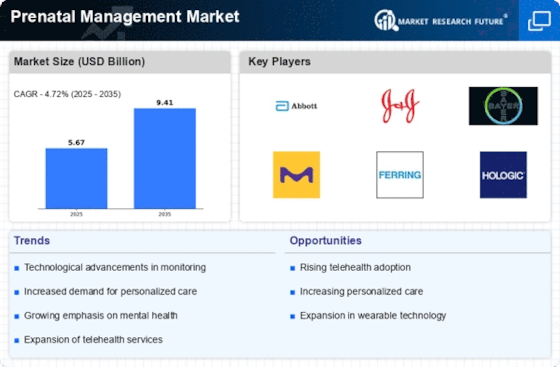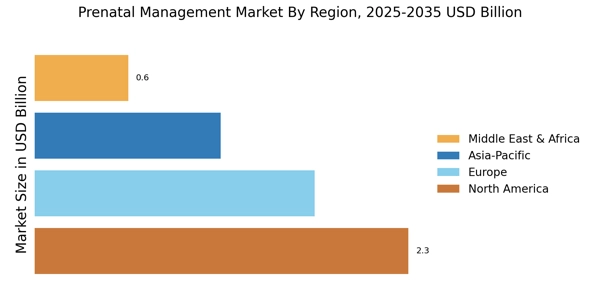Increase in High-Risk Pregnancies
The rise in high-risk pregnancies is a critical factor influencing the Prenatal Management Market. Factors such as advanced maternal age, pre-existing health conditions, and lifestyle choices contribute to this trend. As the number of high-risk pregnancies increases, there is a corresponding demand for specialized prenatal management services. Healthcare providers are focusing on developing comprehensive care plans that address the complexities associated with high-risk pregnancies. This shift not only enhances maternal and fetal health outcomes but also drives the growth of the Prenatal Management Market, as more resources are allocated to support these vulnerable populations.
Rising Awareness of Maternal Health
The increasing awareness surrounding maternal health is a pivotal driver for the Prenatal Management Market. As more expectant mothers recognize the importance of prenatal care, the demand for comprehensive management solutions rises. Educational campaigns and healthcare initiatives have contributed to this awareness, leading to a surge in prenatal consultations and screenings. According to recent data, nearly 90% of women now seek prenatal care in the first trimester, reflecting a significant shift in attitudes towards maternal health. This heightened awareness not only encourages early intervention but also fosters a culture of proactive health management, thereby propelling the growth of the Prenatal Management Market.
Government Initiatives and Support Programs
Government initiatives aimed at improving maternal health significantly influence the Prenatal Management Market. Various countries have implemented policies to enhance access to prenatal care, including subsidized healthcare services and educational programs for expectant mothers. For instance, initiatives that provide free or low-cost prenatal services have been shown to increase the number of women receiving adequate care. This support not only alleviates financial burdens but also encourages regular check-ups and screenings. As a result, the Prenatal Management Market benefits from increased participation in prenatal programs, ultimately leading to better health outcomes for mothers and infants.
Technological Advancements in Prenatal Care
Technological innovations are transforming the landscape of the Prenatal Management Market. The integration of advanced diagnostic tools, such as non-invasive prenatal testing (NIPT) and mobile health applications, enhances the quality of care provided to expectant mothers. These technologies facilitate early detection of potential complications, allowing for timely interventions. Furthermore, the market for prenatal monitoring devices is projected to grow at a compound annual growth rate of over 10% in the coming years. This trend indicates a robust demand for innovative solutions that improve maternal and fetal health outcomes, thereby driving the Prenatal Management Market forward.
Growing Demand for Personalized Prenatal Care
The shift towards personalized healthcare is becoming increasingly evident in the Prenatal Management Market. Expectant mothers are seeking tailored solutions that cater to their unique health needs and preferences. This trend is driven by advancements in genetic testing and personalized medicine, which allow for customized prenatal care plans. As a result, healthcare providers are adapting their services to offer more individualized approaches, enhancing patient satisfaction and engagement. The market for personalized prenatal care is expected to expand, reflecting a broader movement towards patient-centered healthcare solutions within the Prenatal Management Market.

















